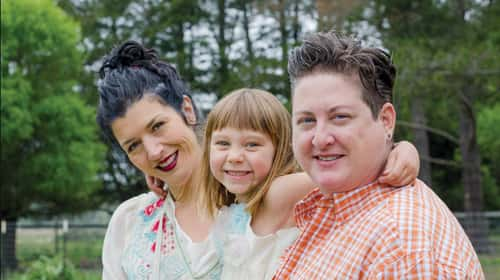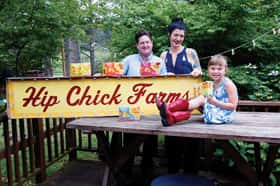 “We are seeking to be the most beloved chicken nugget in the world, with the highest standards, the best taste and impeccable ingredients,” says Jennifer Johnson also known as Chef Jen, co-founder of Hip Chick Farms in Sebastopol. Johnson, along with her co-founder and wife, Serafina Palandech, started playing with an idea, which materialized as Hip Chick Farms in the fall of 2011. At the time, Johnson was the private chef for billionaires Ann and Gordon Getty in San Francisco, and her job included cooking meals for their grandchild and the other children attending the Montessori school in the Getty’s home. The kids at the school absolutely loved her cooking—especially the chicken fingers. This spurred the idea of sharing her recipes and talent with the world, and became the inspiration behind Hip Chick Farms and its line of artisan, transparently sourced, frozen chicken and poultry products.
“We are seeking to be the most beloved chicken nugget in the world, with the highest standards, the best taste and impeccable ingredients,” says Jennifer Johnson also known as Chef Jen, co-founder of Hip Chick Farms in Sebastopol. Johnson, along with her co-founder and wife, Serafina Palandech, started playing with an idea, which materialized as Hip Chick Farms in the fall of 2011. At the time, Johnson was the private chef for billionaires Ann and Gordon Getty in San Francisco, and her job included cooking meals for their grandchild and the other children attending the Montessori school in the Getty’s home. The kids at the school absolutely loved her cooking—especially the chicken fingers. This spurred the idea of sharing her recipes and talent with the world, and became the inspiration behind Hip Chick Farms and its line of artisan, transparently sourced, frozen chicken and poultry products.
The couple was also determined to leave San Francisco and find a farm where they could raise their daughter and expand their family to include an animal-rescue sanctuary. They considered many relocation options until they had that this-is-the-place feeling when they found their magical property in Sebastopol. In addition to cooking for the Getty’s for 16 years, Johnson’s resume includes a degree from the Culinary Academy in San Francisco and 10 years at the highly acclaimed Chez Panisse in Berkeley.
Hip Chick Farms has a product-line of seven offerings, available in more than 3,500 stores across the country, including Oliver’s Markets and Whole Foods locations in the North Bay. While the two women are living their Hip Chick’s dream today on their Ramblin’ Rose farm as co-founders of a thriving business, it has been anything but an easy passage from the early days as a start-up, to the successful enterprise they are running today.
Founding principles
 Palandech, with a background in fundraising for charity organizations, including 10 years as the director of AIDS Walk San Francisco, is taking the lead on the administrative side of the business. She says, “When we made the decision to go for it and make Hip Chick Farms a reality, we established certain values and parameters that were important to us and that we would work within.” The walls in one of their meeting areas is covered with a special paint that makes the entire space into a giant whiteboard. Some of their business goals, value statements and marketing plans are hand written in vibrant colors, where they can easily be seen by the staff, lending an artsy flair to the atmosphere.
Palandech, with a background in fundraising for charity organizations, including 10 years as the director of AIDS Walk San Francisco, is taking the lead on the administrative side of the business. She says, “When we made the decision to go for it and make Hip Chick Farms a reality, we established certain values and parameters that were important to us and that we would work within.” The walls in one of their meeting areas is covered with a special paint that makes the entire space into a giant whiteboard. Some of their business goals, value statements and marketing plans are hand written in vibrant colors, where they can easily be seen by the staff, lending an artsy flair to the atmosphere.
“Reflecting these guiding principles, our chicken products do not contain any artificial ingredients, Palandech continues. “All our chickens are humanely raised on an all-vegetarian diet; and they don’t contain any antibiotics or hormones. Additionally, for all our organic offerings we use only USDA certified organic ingredients.” Johnson and Palandech have a respect for animals, and it’s important to them that they only use chickens and turkeys that are treated humanely for their Hip Chick Farms products.
Their company has humane certification from Global Animal Partnership, an organization that is working with consumers, companies, brands, farmers and ranchers to change the face of animal agriculture. Through Hip Chick Farms, they are working to help shift the food industry to be more animal-welfare conscious. On their farm in Sebastopol, they reside with their six-year old daughter, Rubyrose, as well as two dogs, five cats, three horses, two mini donkeys, two pigs, six pygmy goats, and, of course, lots of chickens and turkeys. All of them spoiled shamelessly.
There are three core values that make up the foundation of Hip Chick Farms that permeates all of their business practices. Compassion is one of these values. Johnson says, There are three core values that make up the foundation of Hip Chick Farms that permeates all of their business practices. Compassion is one of these values. Johnson says, “Compassion for the animals we use in our products; compassion for the people we serve and for each other on the team; basically, compassion for all that we do in contribution to changing the world for the better, one chicken nugget at a time.” Transparency is the second underlying core value guiding their business endeavors. Palandech says, “We believe strongly in transparency of our sourcing and our production practices. There are few farmers that meet our sourcing standards (we currently have four sources across the country), and it’s important that our customers have transparency into where the products come from and the strict quality standards associated with the selection process. To that point, we’re looking into a bar code system that will allow customers to trace the product all the way back to the farmer.” The third fundamental value to Hip Chick Farms is trust. “We have trust in each other on the team and our instincts when it comes to making the cleanest, most sustainable products. It’s also important to us that we build a level of complete trust with all our business partners, and of course our customers, and that this is reflected in day-to-day business operations,” says Palandech. Their website reads, “Our business is based on the founding principle of love after which all good things will follow.
The journey
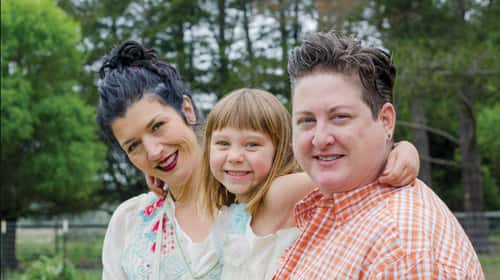 The frozen foods industry in the U.S. generates revenue of more than $32 billion a year (IFIS World Industry Report 2016). While growth of the industry as a whole has somewhat stagnated, the “healthy and organic” segment is experiencing a significant upswing, a trend that Hip Chick Farms is contributing to. While $32 billion is a magnitude difficult to grasp, it means there’s plenty of room for growth for Hip Chick Farms. But how did these two entrepreneurs get going and how did they navigate the often-bumpy road of a new business start-up? “We want every kid in America to have access to the best clean food, but what we’re doing is not cheap, it’s difficult, and it’s expensive, and it’s artisan,” says Palandech.
The frozen foods industry in the U.S. generates revenue of more than $32 billion a year (IFIS World Industry Report 2016). While growth of the industry as a whole has somewhat stagnated, the “healthy and organic” segment is experiencing a significant upswing, a trend that Hip Chick Farms is contributing to. While $32 billion is a magnitude difficult to grasp, it means there’s plenty of room for growth for Hip Chick Farms. But how did these two entrepreneurs get going and how did they navigate the often-bumpy road of a new business start-up? “We want every kid in America to have access to the best clean food, but what we’re doing is not cheap, it’s difficult, and it’s expensive, and it’s artisan,” says Palandech.
Their first products hit the market in early 2013, following initial funding via a Small Business Association (SBA) loan in the latter part of 2012. At the time of the launch, Johnson and Palandech were conducting business out of their home on their newly acquired farm in Sebastopol. During the initial weeks and months of operation, before there were any employees, it was up to the two of them to get the business off the ground, which turned out to a colossal challenge. Funding was extremely difficult to come by, and establishing distribution partnerships proved to be hard as well, both challenges in part due to rampant sexism and competition amongst would-be investors and associates. “The red tape and the blatantly skewed business practices directed towards us as lesbian business owners was mind-blowing,” says Johnson.
After being in operation for two years, and constantly struggling to stay afloat, the couple was faced with having to sell their farm in Sebastopol to pay back money owed as the business was on the verge of failing. To make the situation infinitely worse, in 2015 Johnson was diagnosed with cancer as well as a brain tumor. Palandech says, “We spent months in uncertainty. We kept receiving bad news on top of bad news regarding Jen’s health, and we were completely broke. The stress of it all was overwhelming and we were scared on so many levels.” At this time of despair, Hip Chick Farm’s products could be found in only 300 stores and the couple thought their business venture was coming to a gloomy end.
The game changer
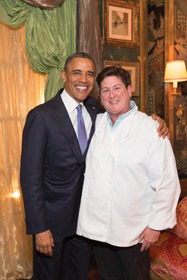 Then things started to change. A very generous check issued by one of Johnson’s friends triggered the beginning of the transformation of Hip Chick Farms. Not only did the cash infusion keep the business alive, it allowed them to further hone their marketing efforts; upgrade their logistics (such as office space); hire much-needed staff; and increase their efforts in research and development. Relative to this turnaround that began with the additional funding around the middle of 2015, Palandech says, “Quality in all that we do is essential, such as hiring the right people, sourcing the best raw material, having the best recipes, and so on. However, in the frozen food business, quantity, or volume, is equally as important as the economies of scale and the costing that goes along with that makes a huge difference. As we were able to increase our production volume, the margins went up and we finally made it past the threshold from survival mode, to thriving.”
Then things started to change. A very generous check issued by one of Johnson’s friends triggered the beginning of the transformation of Hip Chick Farms. Not only did the cash infusion keep the business alive, it allowed them to further hone their marketing efforts; upgrade their logistics (such as office space); hire much-needed staff; and increase their efforts in research and development. Relative to this turnaround that began with the additional funding around the middle of 2015, Palandech says, “Quality in all that we do is essential, such as hiring the right people, sourcing the best raw material, having the best recipes, and so on. However, in the frozen food business, quantity, or volume, is equally as important as the economies of scale and the costing that goes along with that makes a huge difference. As we were able to increase our production volume, the margins went up and we finally made it past the threshold from survival mode, to thriving.”
Johnson’s health took a turn for the better, just as the business started to turn around. This was also around the time when Johnson and Palandech were named to Food & Wine and Fortune magazines’ “Most Innovative Women in Food” list. Johnson was also invited to the White House where she cooked a meal for President Barack Obama and his staff, perhaps a confirmation that the wind had shifted and they were picking up speed going straight ahead. Adding to the momentum, in July 2016, Hip Chick Farms appeared on CNBC’s reality show “West Texas Investors Club” and walked away with a half a million dollars invested in their business. “We were pretty nervous about it”, says Johnson. “We were a progressive, left coast, lesbian couple, and they were two self-made millionaires from West Texas. We could not be farther apart, one would think.” However, the two investors, Mike “Rooster” McConaughey (yes, brother to the actor) and Wayne “Butch” Gilliam were thoroughly impressed with the frozen chicken business in Sebastopol and the hip chicks making the pitch, and issued a check on the spot.
Direction and approach
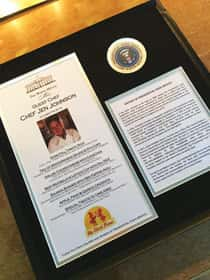 Hip Chick Farms can now be found in more than 3,500 stores, a marked increase from the 300 they were in two years ago, and they are projecting to break 5,000 by the end of 2017. When they first started, they were making product batches of 100 pounds. Today, they make batches of 40,000 pounds. “Hip Chick Farms has the hardest working board. They are phenomenal,” says Palandech. The board has helped them build infrastructure properly, so that Johnson and Palandech have been able to consciously create a corporate culture they are proud of. Palandech expands on the ‘let’s go big’ strategy and approach that has positioned them for growth and prosperity going forward. “Of course, the influx of funding in 2015 was instrumental in basically keeping us solvent and alive, and it allowed us go forward with our plan and our approach. So many things happened seemingly at the same time, so it’s hard to tie the events to a timeline. But one of our first actions was to engage Amanda Steel from Numi Tea as a subject matter expert [entrepreneurship] consultant to help us with our marketing plan. That plan shaped into three tiers: public relations and media; trade promotions; and social media.”
Hip Chick Farms can now be found in more than 3,500 stores, a marked increase from the 300 they were in two years ago, and they are projecting to break 5,000 by the end of 2017. When they first started, they were making product batches of 100 pounds. Today, they make batches of 40,000 pounds. “Hip Chick Farms has the hardest working board. They are phenomenal,” says Palandech. The board has helped them build infrastructure properly, so that Johnson and Palandech have been able to consciously create a corporate culture they are proud of. Palandech expands on the ‘let’s go big’ strategy and approach that has positioned them for growth and prosperity going forward. “Of course, the influx of funding in 2015 was instrumental in basically keeping us solvent and alive, and it allowed us go forward with our plan and our approach. So many things happened seemingly at the same time, so it’s hard to tie the events to a timeline. But one of our first actions was to engage Amanda Steel from Numi Tea as a subject matter expert [entrepreneurship] consultant to help us with our marketing plan. That plan shaped into three tiers: public relations and media; trade promotions; and social media.”
Palandech says they made the decision to develop their social media campaign of informing and educating consumers in-house, and engaged interns from Sonoma State University to help them with their online content. “Our intent was to not just put a picture out there on YouTube and other channels, but to actively engage with ads and increase SEO (Search Engine Optimization). One year ago, we had 100 followers on Facebook. Now we have 25,000, and we have made similar strides with Instagram and Twitter.” Along with expanding their social media footprint, they’ve also earned media recognition, as their company has grown, and their story has been featured in a number of publications. Hip Chick Farms also does trade promotions such as BOGOs (Buy One Get One free). “We want to engage folks to let them know there are quality products in the freezer. We are creating a brand that builds the category, not just expands it,” says Johnson.
Since neither one of them had any entrepreneurial experience to speak of, they made an early and conscious effort to reach out to other local entrepreneurs in an attempt to learn as much as they could from their experience. Though the going was rough at times, they also caught some lucky breaks, like having Greg Hartman, winner of the prestigious Cliff Adler Award for "Heart in Business" in 2003, and president of Oasis Sales and Marketing, volunteer to take them under his wing and mentor them for close to a year. “Without the advice and support from so many wonderful people at companies such as Cowgirl Creamery, Three Twins, La Tortilla Factory and Shelton’s Natural Food Market, we would not be anywhere near where we are today,” says Palandech. The executives at Whole Foods were also instrumental in helping the Hip Chicks strategize and shape their go-to-market approach. “There is such a deep level of kindness in our community, and everyone wants to help each other succeed, and in doing so, making this a better place for all of us.”
Eighteen months on the horizon
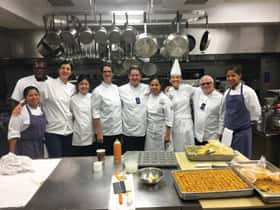 According to Chicago’s Booth School of Business, roughly nine out of ten startups fail, and the numbers are even less appealing for lesbian-owned companies. Based on this statistic alone, one can conclude that the Hip Chick Farm’s story is a successful one. On the topic of success, Palandech chimes in, “Success to us is not only measured in dollars. Everyone who’s been involved in a startup knows what kind of commitment it takes and how many hours you invest in the effort. To Jen and me, success means you wake up every morning with gratitude for the accomplishments you’ve made, and acceptance of the things that haven’t worked out.
According to Chicago’s Booth School of Business, roughly nine out of ten startups fail, and the numbers are even less appealing for lesbian-owned companies. Based on this statistic alone, one can conclude that the Hip Chick Farm’s story is a successful one. On the topic of success, Palandech chimes in, “Success to us is not only measured in dollars. Everyone who’s been involved in a startup knows what kind of commitment it takes and how many hours you invest in the effort. To Jen and me, success means you wake up every morning with gratitude for the accomplishments you’ve made, and acceptance of the things that haven’t worked out.
Johnson says, “It’s been very satisfying for me to work alongside Serafina. During the times when seemingly everything we tried was shot down, it was inspirational seeing how strong she was and how she always stayed positive and kept striving forward. To me, that’s certainly a component of being successful.” Palandech feels exactly the same way about her spouse, and says, “I think Sheryl O’Loughlin, fellow entrepreneur and former CEO of Clif Bar, phrases it well in her book Killing It! Traits such as having an obsessive drive and putting in an unhealthy number of hours make you a good entrepreneur. Two things can be equally true, and the flip side is that those same traits can ‘kill you’ when there’s a severe imbalance between work life and family life. To us, finding this balance, being able to relish the moment, and enjoy the ride is important and an integral part of being successful. While we most definitely have a fiscal responsibility, we also try to have fun in all that we do. We have a great group of people here and something we’re always striving towards is to inject fun ‘family’ activities as much as we can.”
A hip chick future
 What comes next for Hip Chick Farms? “At any given time, we take a planning view of looking 18 months forward. One might ask: How can you possibly forecast with any accuracy where you will be one-and-a-half years from now? The answer, at least in our case, is that you can’t. But the point of the rolling 18 month roadmap is to force us to look up and not merely focus on the here and now. In doing so, we jokingly adhere to the planning approach called WAG—Wild Ass Guess,” says Palandech with a laugh.
What comes next for Hip Chick Farms? “At any given time, we take a planning view of looking 18 months forward. One might ask: How can you possibly forecast with any accuracy where you will be one-and-a-half years from now? The answer, at least in our case, is that you can’t. But the point of the rolling 18 month roadmap is to force us to look up and not merely focus on the here and now. In doing so, we jokingly adhere to the planning approach called WAG—Wild Ass Guess,” says Palandech with a laugh.
Specific upcoming expansion activities on the rolling roadmap include plans well under way, to add as many as 14 new all organic and humanely raised frozen chicken products to their lineup. Also, while the vast majority of frozen foods in this country are sold via grocery outlets, Hip Chick Farms is keenly exploring alternative distribution methods, including QVC TV shopping.
Earlier this year they had the first QVC sales event and, to their delight, sold 4,500 boxes of chicken fingers in four minutes. Only a few weeks later, they did another test of this new distribution channel and sold another 20,000 boxes of chicken fingers in less than seven minutes. Needless to say, they’re working closely with QVC to continue to build their business in this unique way. Another upcoming addition to the business, and source of excitement, is the opening of the Chicken Fingers and Wine tasting room in downtown Sebastopol on Main Street in the old Apple Inn location around the corner from their business office. Johnson who was able to quit her day job in January and devote herself full time to the Hip Chick Farms, is enthusiastic about having a kitchen for Research and Development (R&D). “This will be the only venue in the world for chicken fingers and wine tasting under the same roof. We are super excited. Construction is under way as we speak and we’re hoping to open up to the public in early summer.”
As the industry is moving more and more towards organic products, consumers are also looking more for fresh and refrigerated food items as opposed to frozen. This being the case, The Hip Chicks are looking into a preservation method called High Pressure Pasteurization (HPP). HPP has been used extensively for juice products, but is now being tested for poultry products as well, as an alternative to freezing. Using this method can extend the shelf life of refrigerated products, all naturally, anywhere from 60 to 120 days. While HPP treated goods don’t replace frozen foods, Hip Chick Farms is exploring the preservation method as a way to supplement to their current product line of frozen products.
Anyone who hasn’t yet tried the panko-crusted chicken fingers from Hip Chick Farms, needs to make it a point to search out this extra special product. Though chicken fingers are considered a kid-friendly food, in this case they’re not only for the young crowd. Hip Chick Farms items are fit for the whole family, and you’ll know you’re eating healthy, organic food, from humanely-sourced chickens, that is made by a local company where all the employees are treated like family, under the leadership of two compassionate and hardworking women. Traits like creativity and dedication never go out of style, and as long as Johnson and Palandech are running the roost, Hip Chick Farms will remain hip.


